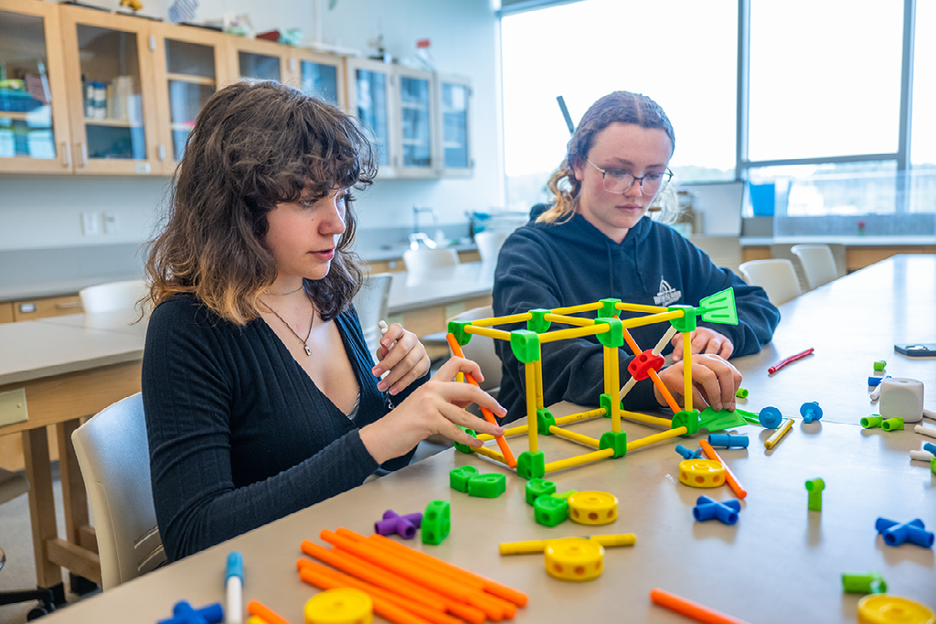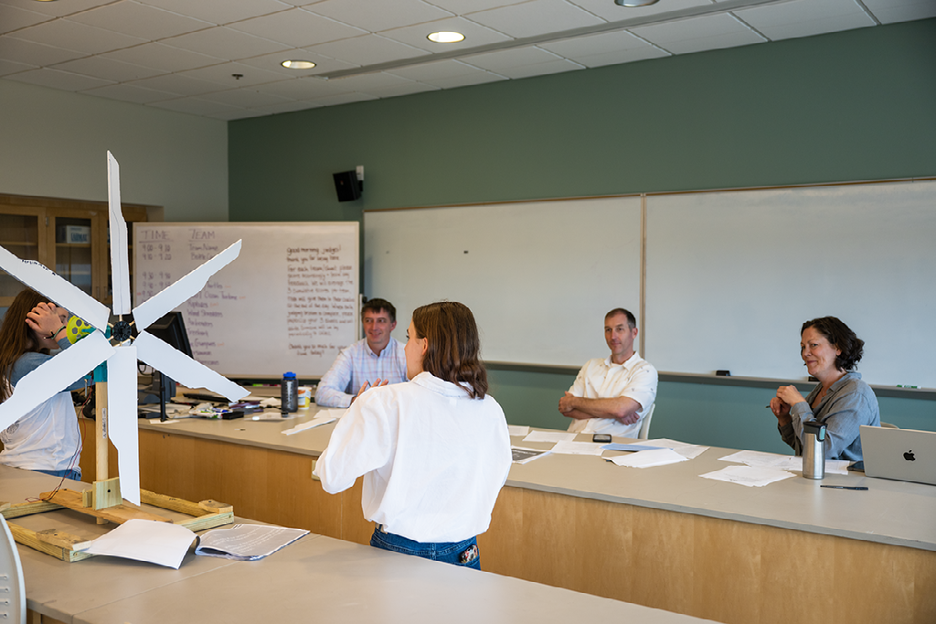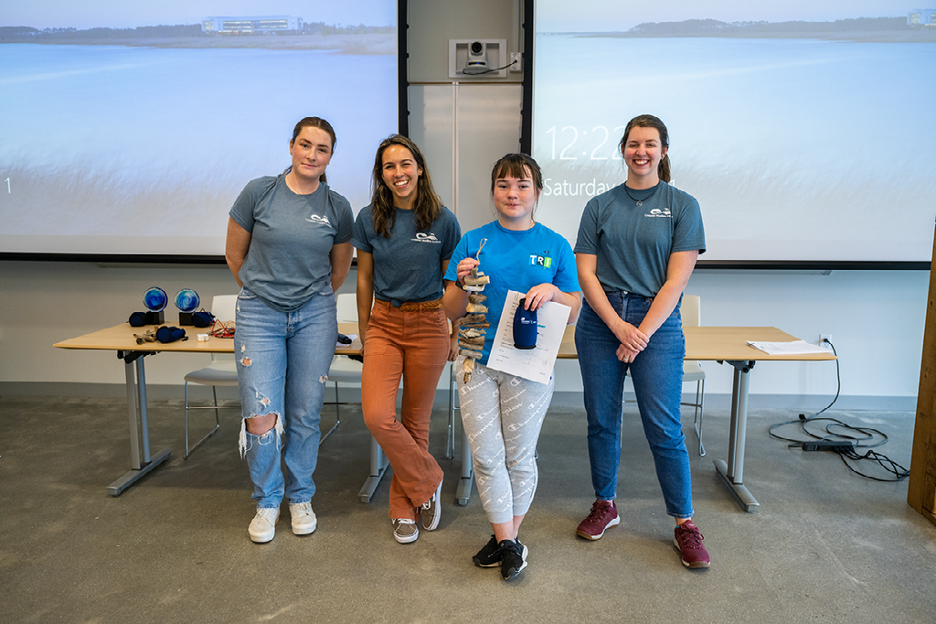Currents circulating. Wind blowing. These were both simulated at the 2023 North Carolina Renewable Energy Challenge held at the Coastal Studies Institute in early April.
Each spring, CSI, in partnership with Jennette’s Pier and KidWind, hosts the annual event in hopes of exposing more and more young minds to the growing sectors of renewable energy. Not only do humans hope to divert reliance on fossil fuels to renewable sources instead, but the job markets for wind, solar, and water power are continuing to expand.

A student watches a monitor to see how his team’s device performs in the wind tunnel.

Team Riptides (First Flight MS) stand in front of their device mounted to a metal frame prior to testing.
Through programs presented by CSI and in preparation for the half-day competition, students from all over North Carolina learn all about electricity and renewable energy. Where does it come from? How does it work? What are the benefits? What are the obstacles? These are all questions that the competing students may first ask and then must familiarize themselves with the answers. But that’s just the start.
The students who participate in the Challenge, either individually or in teams, are also tasked with designing and building their own renewable energy device. For this year’s competition, students could choose between wind energy and ocean current energy. For both categories, teams had to create a turbine, made for their respective mediums, that would spin a small generator and thereby produce electrical energy.
Cape Hatteras Secondary, Manteo High, First Flight Middle, Waters Edge Village School in Corolla, Currituck County Middle Schools, and Douglas Byrd High in Fayetteville, NC, were represented in the event; and a total of nine wind and four ocean current teams participated.
Each team had a chance to test their device and go before a panel of judges comprised of three industry experts. Their device performance and the judges’ technical interviews were factored into each team’s final score. Teams also received points when they participated in Instant Challenges- hands on activities set up throughout the building to help them gain a better understanding of different renewable energy sources.

In one of the Instant Challenges, teams were tasked with creating wave energy converters, or WECs, from Tinker Toys to be tested in a small table-top wave tank.

A team competing in the wind category brings their device before the panel of judges.

Avangrid Lead Fisheries Outreach Coordinator John Harker delivers the keynote address to the teams, and their coaches and parents.
Between testing, and judging, and Instant Challenges, there was still time, of course, for fun and chit chat. All morning students could be heard laughing and seen skipping around the building, all the while interacting with their mentors and other teams from around the region. Once the activity areas closed, and pizza arrived for lunch, it was time for the keynote address.
John Harker, Lead Fisheries Outreach Coordinator for Avangrid, delivered the special presentation of the day. Specifically addressing the students, Harker discussed the current state of wind energy and the future of renewables in the US. Avangrid, a sustainable energy developer of nationwide projects, including an upcoming offshore wind farm located 27 miles off the northern Outer Banks, was a sponsor of the NC Renewable Energy Challenge for 2023.
And the final to-do for the day? Announce the winners! Prizes were awarded to the top teams in each age division and category.
Maili McManus, who competed solo, was the top performer in the high school wind division. In the middle school wind division, teams from Waters Edge Village School took home both first and second place. Team Name secured the top prize over Bottle Cap by only four points. In addition to the mementos the winning wind teams took home to mark their success, they also received an invitation to compete at the national KidWind event held in Colorado in May.

Maili McManus, Manteo High School. Top prize, HS Wind.

Team Name, Waters Edge Village School. First place, MS Wind.

Bottle Cap, Waters Edge Village School. Second place, MS Wind.

The Beaver, Douglas Byrd High School. Top prize, HS Ocean Currents.

Flappy Turtles, Currituck County Middle Schools. First place, MS Ocean Currents.

The Gunyuns, Cape Hatteras Secondary School. Second place, MS Ocean Currents.
As for the ocean energy winners, The Beavers from Douglas Byrd High School claimed the top prize for students in 9-12 grades. In the middle school ocean energy division, The Flappy Turtles from Currituck County took the lead over second-place team The Gunyuns, of Cape Hatteras Secondary School, by just one point.
The North Carolina Renewable Energy Challenge would not be possible each year without the support of volunteers and donors. Each of the areas mentioned above requires extra hands to run efficiently and provide appropriate instruction; and through generous donations and support from sponsors such as the NC Renewable Ocean Energy Program and Avangrid, CSI can offset supply and travel costs for teams. As with any event, it is one that takes time and planning for it to come together; however, it is well worth it to be able to provide an extra-curricular outlet for students to learn about the future of renewable energy.



 Based at the Coastal Studies Institute (CSI), the North Carolina Renewable Ocean Energy Program (NCROEP) advances inter-disciplinary marine energy solutions across UNC System partner colleges of engineering at NC State University, UNC Charlotte, and NC A&T University. Click on the links below for more information.
Based at the Coastal Studies Institute (CSI), the North Carolina Renewable Ocean Energy Program (NCROEP) advances inter-disciplinary marine energy solutions across UNC System partner colleges of engineering at NC State University, UNC Charlotte, and NC A&T University. Click on the links below for more information. ECU's Integrated Coastal Programs (ECU ICP) is a leader in coastal and marine research, education, and engagement. ECU ICP includes the Coastal Studies Institute, ECU's Department of Coastal Studies, and ECU Diving and Water Safety.
ECU's Integrated Coastal Programs (ECU ICP) is a leader in coastal and marine research, education, and engagement. ECU ICP includes the Coastal Studies Institute, ECU's Department of Coastal Studies, and ECU Diving and Water Safety. The ECU Outer Banks campus is home to the Coastal Studies Institute.
The ECU Outer Banks campus is home to the Coastal Studies Institute.

